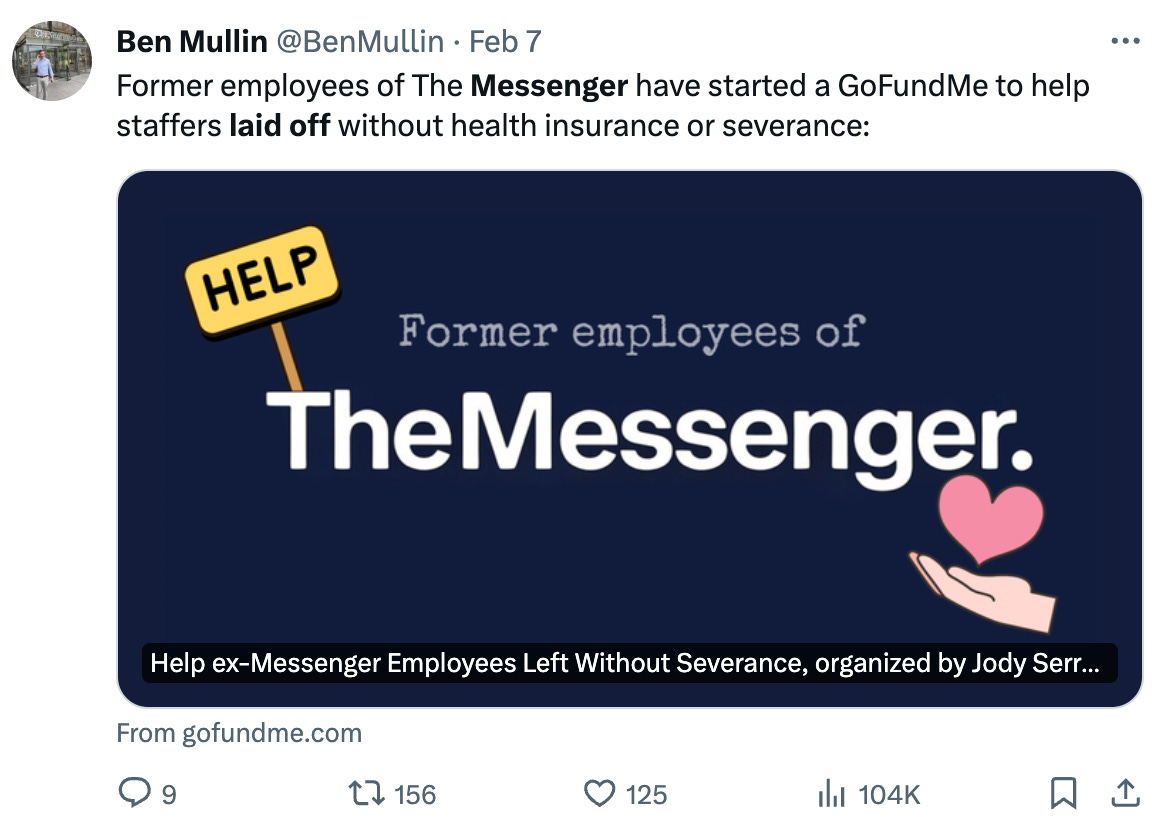"Burning light. Flashing back from the mirror sea."
The Messenger folded. It was anything but a surprise, but it still sucks for those laid off and for the future of the news industry.
This week’s soundtrack: Karenia Brevis - “Daughter”
When one is laid off from a job, things get pretty weird. The gamut of emotions is certainly spanned, from anger to depression to pride to whatever else you can cook up.
In my case, I did a strange funereal thing wherein I gathered all my GovExec swag from 16 years, put it in boxes and brought it to my storage unit. I was lucky that I found a job sorta quickly (I was unemployed for less than seven weeks), but that time was spent applying for any and every job that seemed even a little bit like I could do it. This meant I applied for a few jobs for which I was overqualified (I was rejected for one almost immediately, which really hurt my already-bruised feelings) and a bunch for which I was woefully unqualified.
Somewhere in the middle was a job at a startup called The Messenger. They never back to me – I guess my decade and a half out of sports journalism didn’t help my case – and I’m not sure they even acknowledged that I sent over my résumé. But, I did apply to be the Baseball Editor at this startup news thing. The Messenger, as you have almost certainly heard, closed up shop late last month. Three hundred people lost jobs.
The stories about the startup dumbassery have come fast and furious, from the excessive office spaces they leased to the bad strategy to the general stupidity of the whole endeavor. Its “both sides/we’re above it all” news judgment was doomed from the start; there is very little market in such a publication now or ever. More than that, burning through $50 million in startup capital – as founder Jimmy Finkelstein did – is unheard of in the media world. That’s Uber stuff.
The Messenger, of course, was a bad idea from the start because media itself is a bad idea right now. People get their news from social media increasingly, a set of avenuves that are outrage-driven more than anything. Everything is the New York Post’s and Fox News’ “Death Wish is real and you should be scared” model on social media, only somehow worse. It’s far from useful, but it does keep people clicking and tapping and watching and engaging.
It doesn’t help The Messenger was chasing ghosts of journalism past while trying to live in the journalism future. Prominent editors clashed with something called a "Chief Growth Officer” and the Messenger was constantly behind everyone else on, well, everything. It could neither get the clickbait nor the outrage right; there is no model for that sort of thing in the digital age. It was news you couldn’t use.
As Chris Thompson wrote in Defector:
The site's writers were forced to churn out empty-calorie slop in a desperate game of SEO whack-a-mole because of Finkelstein's breathtakingly wrongheaded business model, which sought to generate $100 million in annual revenue from programmatic advertising. But programmatic advertising is no longer calibrated for human work or human traffic or primary income. It is now tuned to fire pennies at bot-run content filters for engaging in digital high-fives with search algorithms.
As I’ve written before, I do not think people have a correct understanding of the economics of the news and media business at all (or any economics at all!). This appears to have bubbled up to media moguls, who keep stepping on rakes over and over.
I feel bad for people like Mike Tanier, who was part of the Messenger’s layoffs (and two other newsrooms’ layoffs!), as he wrote in Defector recently. Like to many of us, the news industry is imploding around him and things look worse and worse each day. There’s a libertarian economic argument that journalism is not as valued as it used to be; I imagine it would be something about a bubble and the market and whatever (trying to think like a libertarian makes my head hurt). But, these are real people who believed in something, even if it was fanciful. They, like so many of us, were just numbers on a spreadsheet for Finkelstein; not as sexy as his hot office spaces nor his high-minded ideals about “non-partisan news.” The employees who lost jobs, not shockingly, launched a GoFundMe, though there is also a lawsuit pending.
It comes as the Wall Street Journal downsized. I never meant for this newsletter to be about media layoffs nor do I intend on it continuing that way. The industry is dying and democracy is going with it. It’s impossible not to see that; “news” is spread quickly on Instagram stories about wars more than people actually click through to read stories. TikTok explainers have replaced even USA Today’s famously facile infographics; they can explain why the world is flat in a far more entertaining way than anyone can imagine (fact: The Earth is not flat!). Media literacy is dangerously low for such a difficult time.
I don’t have a positive or pleasant conclusion here. The watchdogs are shrinking or going away. While I didn’t expect to be part of the watchdog world as the baseball editor of The Messenger, I’m still sad to see any publication close.
Lulu Update
As mentioned a few weeks ago (I took last week off because my life has been very stressful), Lulu and I did some road tripping recently. She and I spent approximately 26 hours in a car together over the span of a week and she was shockingly good in the car. I’m about to head on a work trip, so she is at the boarding place, where she will be more spoiled than she is at home.
A Recommendation: A Place Called Ilda
My former boss Tom Shoop wrote a book and it is terrific. As he writes in the introduction, this story is not just about a place in Virginia, but rather about the history (and erasure) of enslaved Black people in the U.S. and the continuing erasure of them. The book is super readable, engrossing and I cannot recommend it enough.






